We’ve all seen those “company core values” posters laden with nice-sounding words that have zero effect on day-to-day operations. Too often, the act of creating core values is seen as a formality that has little to no actual impact on the business.
And there’s some truth to that.
Core values that are hastily written or poorly applied have very little impact. But when core values are created with care, they make a significant difference in the success of a company.
A strong set of core values guides better decision-making, attracts top talent, and builds a healthier organization in the long term. This article covers everything you need to know about creating core values for your business and putting them to work.
Next steps: After you create your own core values, showcase them with a company values video. Head over to Biteable for hundreds of brandable video templates and workplace-ready scenes to get you started.
Create videos that drive action
Activate your audience with impactful, on-brand videos. Create them simply and collaboratively with Biteable.
What are company core values?
Your company core values are an established set of beliefs, principles, and philosophies that guide your business. A company’s values play out in both big and small ways. They help guide the business as a whole, and they also help define how individual members of the company behave toward customers and toward each other.
Your core values should be…
As you create your core values, remember that first and foremost that those values they should be:
Relevant
Your core values will get ignored if they don’t align with what your business actually does in practice.
Actionable
Likewise, if your company’s core values fail to give team members guidance for making decisions, they are useless.
Delivered in multiple formats
After you create your core values, put them into multiple formats so employees remember them. Turning your values into an acronym and creating a core values video are two great ways to make those values more memorable and engaging.
If you work from a company values template, it takes very little time to create your own core values video.
Your core values should not be…
When it comes to creating core values, there are a few easy mistakes to make. When you think you’ve come up with a good set of company values, do a sanity check to make sure you haven’t stumbled into one of these common pitfalls.
Your core values should not be:
Basic moral principles
If you check around, you’ll see examples of core values that are little more than the bare minimum requirements of being a decent person.
“Honesty,” “respect,” and “teamwork” are great to have. But basic moral principles are best handled in your code of conduct and HR materials. Your core values should be one layer up from foundational principles.
Focus on creating core values that help your business improve its products or services, develop better solutions, and operate more efficiently.
Vague platitudes
Being vague is an easy mistake to make. We naturally want our company core values to cover every possible situation, so we default to platitudes like “hard work” and “high quality.” The problem with being vague is that it doesn’t help people make better decisions.
The solution here is to be more specific. Refine your core values statement to reflect exactly what high quality or hard work looks like in action for your company.
Hard to remember
People need to be able to put your core values into practice. If your company values are too long or complex, they’ll be hard to remember. That makes them difficult to apply. It’s unlikely that anyone is going to whip out their company core values statement whenever they need to make sure they’re doing things right.
Keep your core values relatively short and sweet.
Why clearly defining your core values is important
Ultimately, your company core values act as a guidepost for making decisions at every level of your business.
Your core values guide everything from product development to marketing. Clearly defined core values enable your company to operate better as a whole and your employees to make the best individual work decisions in every stage of your business.
Explicitly stated core values also help your business attract the right people. Being skilled doesn’t always make a person a good fit for your company. And candidates assess your business just as much as you assess them. Clear core values help both you and your candidates determine if a working relationship is a good fit.
Creating core values: What to consider when crafting your own
Remember that your core values need to guide your business decisions and ultimately make your company more successful. Your company core values should reflect who your business serves, what your company delivers, and the overall environment of your industry.
Also, it’s best if you create your company core values after you develop your company mission statement. That way, your values support your mission and align with that central goal. Have your mission statement on hand as you go through this process.
Follow this process when you sit down to create your own core values.
1. Get the team talking
The first step is to talk to your current team. Everyone can contribute, but your founders and long-time employees are going to be in the best position to offer insights. The goal here is to identify the values your company already has and what makes your business unique right now.
This is an information-gathering process. Encourage everyone to contribute anything they can think of. You want as many honest insights as you can get.
Ask yourselves these questions:
What are the most important aspects of your finished product?
Consider the most valuable part of your product or service. Your core values should give everyone in your company guide rails for every aspect of delivering the final product.
- How do you want your business to make your customers feel?
- How do you want your company to be different from the competition?
- What is the most important goal when employees make design, production, or customer service decisions?
What are the best ways to measure success for your business?
Believe it or not, profit is a poor metric for measuring business success. Profit is a byproduct of solving problems for your customers and delivering a positive experience as you solve those problems.
When you answer this question, look for metrics that show how well you solve customer problems and whether or not you solve those problems in the way you want. From here, you can develop a core value that helps your company improve those metrics.
How do you want your core values to affect your internal company culture?
Your company values work in two ways: internally and externally.
Even if they’re externally focused, your core values still affect how your teams treat each other and what sort of internal decisions they make. Your values should be written in a way that doesn’t put excessive pressure on a single team or make it difficult for different parts of the business to work together.
After you answer these three questions, you should be ready to dig in and create your core values.
2. Synthesize the inputs
Talking to your team will give you a ton of unfiltered information. Naturally, the next step is to filter and synthesize that information. Set aside the outliers and anomalies that aren’t central to developing your core values. Then look at the bulk of the information and identify patterns.
Compare the input from your team with the insights you identified during the prep questions phase. This will show you where your current values match up with your goals and where you may want to take a leap and create some forward-leaning values.
At this point, you’ll begin to see a set of core values emerge. Trim that list down to a manageable number. Five to seven core values are enough to create strong guidance while still being easy enough to remember.
Once you’ve identified a rough set of core values, get everyone together again and gather feedback on the values you’ve identified. Be warned that you won’t get a full consensus. But make sure that at least a majority of your team agrees with the values and believes they can abide by them.
Tweak your rough list of values based on this feedback. Double-check to ensure that your values are viable over the long term. You can adapt and adjust your company’s core values as your business grows, but the goal is to create values that will remain stable for a long time.
3. Bring in the polish
At this point, you have a rough draft of core values. Now it’s time to polish them up and make them as memorable as possible.
This is where your copywriters, designers, and marketers come in. They’ll help you clarify the wording, create visuals, and add memory devices such as alliteration, an acronym, or a core values video to help make your values stick.
A word of warning: be careful with the memory device. It’s easy to go over the top here. You also don’t want your values to come off as silly. Often, being clear and simple is memorable enough.
Give your final draft a good once over before you go live with your core values. Double-check that they’re crystal clear, action-oriented, and that your visualization and memory device is well-polished.
You’re going to repeat your core values a lot. The visualizations will be distributed to everyone in your company, repeated often, and posted where customers will see them. Make sure your finished product is well-polished and that you’re proud of it.
10 examples of company core values done right
As promised, here are a few of our favorite company core values examples. We hope they help you as you create your own.

1. It is our nature to innovate.
2. Nike is a company.
3. Nike is a brand.
4. Simplify and go.
5. The consumer decides.
6. Be a sponge.
7. Evolve immediately.
8. Do the right thing.
9. Master the fundamentals.
10. We are on the offense — always.
11. Remember the man. (The late Bill Bowerman, Nike co-founder)
Why they work
One of the standout features of Nike’s core values is that they’ve held up for a very long time. These company values have helped Nike continue to be successful through decades of cultural evolution. Nike clearly took its time choosing and crystalizing its core values.
Beyond that, there are a few aspects of these values that really stand out.
First, values one and two state that Nike is a company and a brand. These make it very clear what Nike does (build a brand and let the products sell themselves) and give context for applying the other nine company values.
The other standout core value is number seven, “evolve immediately.” It’s a great groundwork for how the company solves problems. If they find that something isn’t working, they change what they’re doing ASAP.

1. Focus on the user and all else will follow.
2. It’s best to do one thing really, really well.
3. Fast is better than slow.
4. Democracy on the web works.
5. You don’t need to be at your desk to need an answer.
6. You can make money without doing evil.
7. There’s always more information out there.
8. The need for information crosses all borders.
9. You can be serious without a suit.
10. Great just isn’t good enough.
Why they work
Google’s core values are a great accompaniment to the Nike values. Google is an example of core values that have driven meteoric success, while Nike shows how strong values can create long-term durability.
Google’s core values work because they are incredibly focused. All ten of these values relate in some way to the company being an expert in efficiently distributing information.
It’s clear that Google’s core values are derived from a singular goal. This makes those values actionable, which is likely why they’ve helped Google grow so quickly.

1. Play for each other.
2. Build for durability.
3. Make something better today.
Why they work
The great thing about Amperity’s core values is that they’re quick and easy to remember. But despite being minimal, they’re effective. Just these three values can help anyone working for Amperity make decisions that move toward the larger goal: make an immediate impact that will also reverberate in the long term.
Apptio

1. Create wildly successful customers.
2. Deliver outstanding results.
3. Continuously improve.
4. Develop our people.
5. Operate with transparency.
6. Are accountable.
Why they work
We like these core values because they’re a bit similar to the Biteable core values. They place emphasis on putting the customer first, overdelivering, and open communication.
Apptio also clearly understands that their core values influence the internal and external actions of the company, and they wrote their values to reflect that. Last thing: note how all these values are written so that they implicitly start with “we,” which subtly turns the values into actions.
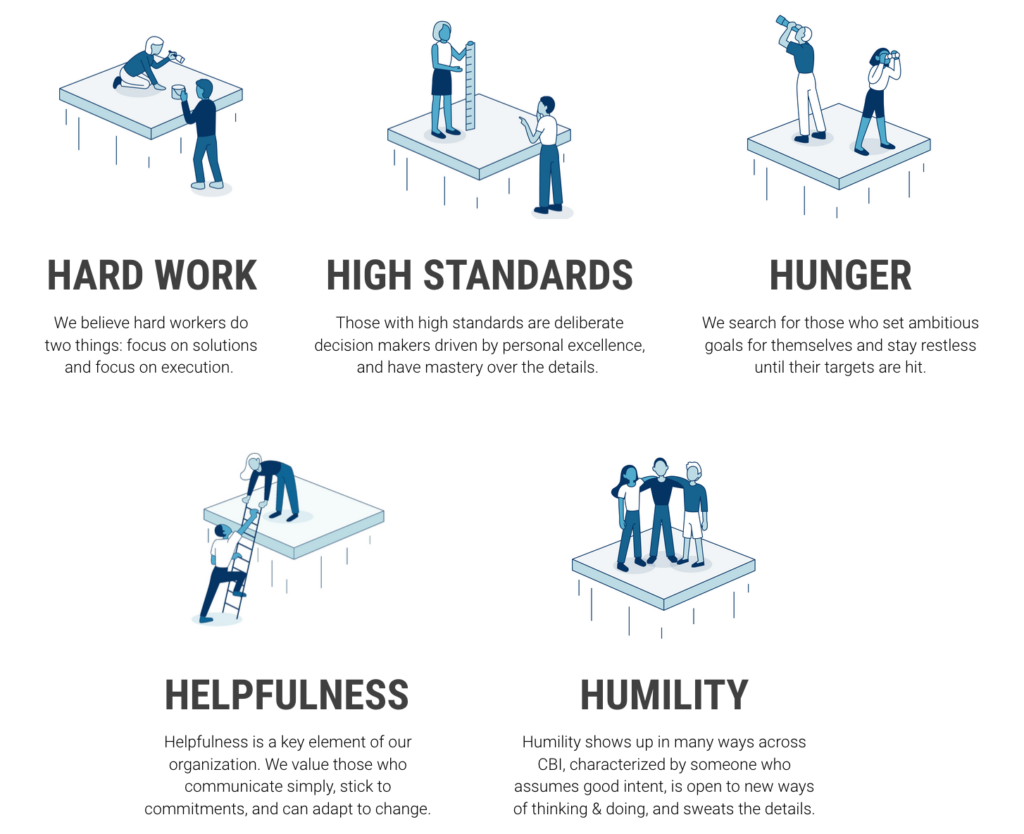
1. Hard work.
2. High standards.
3. Hunger.
4. Helpfulness.
5. Humility.
Why they work
First and foremost, these company core values are easy to remember (note the alliteration). They’re also easy to visualize. They not only guide decisions for current employees, but also help potential hires quickly assess whether or not they’ll be a good fit for the company.
CB Insights did a great job of creating memorable core values that establish what sort of people they want in their company and how they want the company to operate.
Civitas Learning
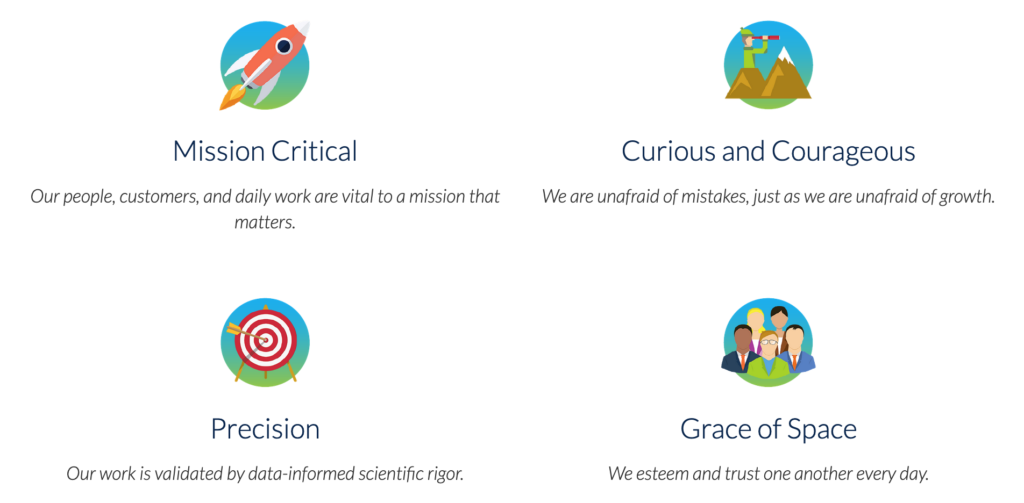
1. Mission critical.
2. Curious and courageous.
3. Precision.
4. Grace of space.
Why they work
These core values cleverly distill complex goals into short, memorable value statements. Civitas Learning works to be indispensable to their customers. They’re not afraid to try new things to achieve that goal. And they focus on rigorous data to measure success.
The last one, “grace of space,” is the core value that guides how the company behaves internally as they move toward the other three goals. In short, these values quickly address what the business is trying to do and how it’s done.
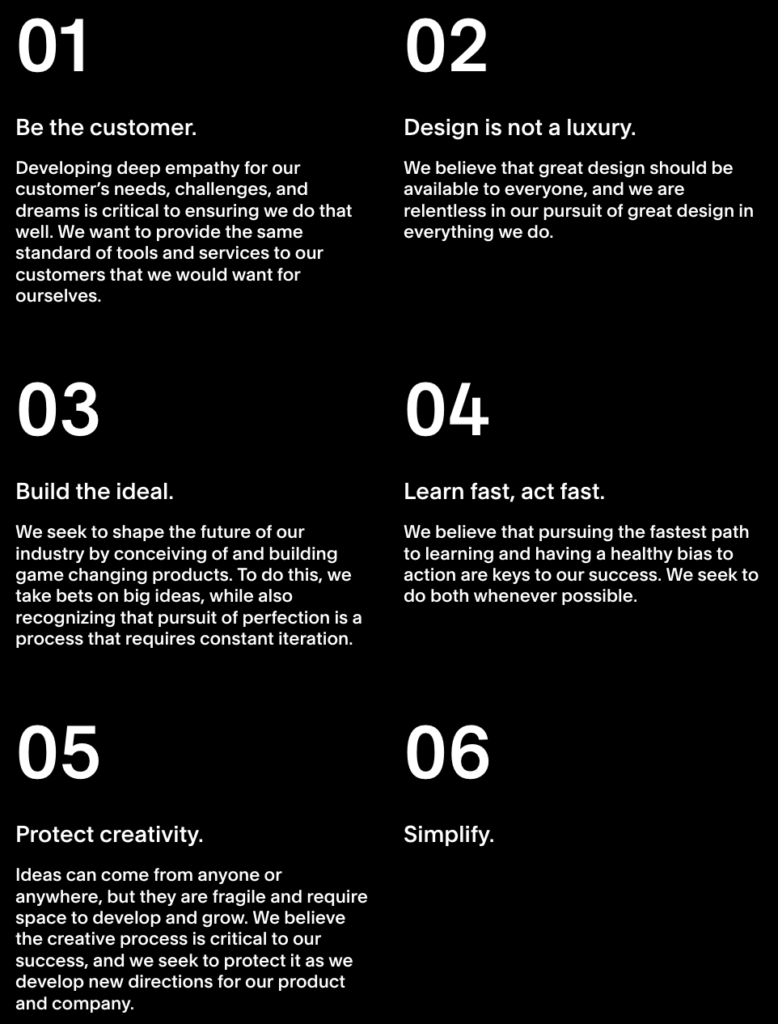
1. Be the customer.
2. Design is not a luxury.
3. Build the ideal.
4. Learn fast, act fast.
5. Protect creativity.
6. Simplify.
Why they work
Squarespace’s core values are focused squarely (pun definitely intended) on being specific about the product they deliver and clear about which direction decisions should take the company. These values also establish a cool metric for measuring success: build something you would want to use.
Teachable
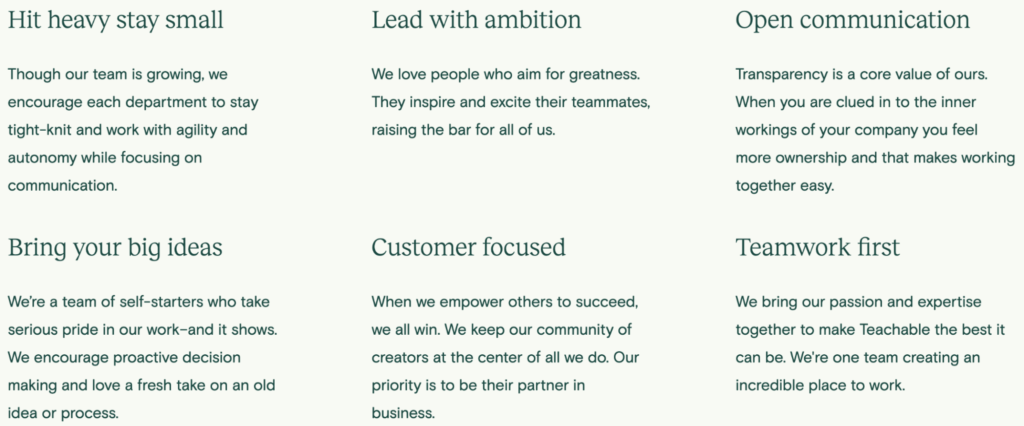
1. Hit heavy, stay small.
2. Lead with ambition.
3. Open communication.
4. Bring your big ideas.
5. Customer-focused.
6. Teamwork first.
Why they work
The smart thing about these core company values is that they create an impressively specific vision for how the business is organized and operates. They work on the approach that the customer will be well-served if the company’s internal operation is strong.
These core values give a clear picture of what type of company Teachable is, which is great for recruiting and clarifying how the business works.
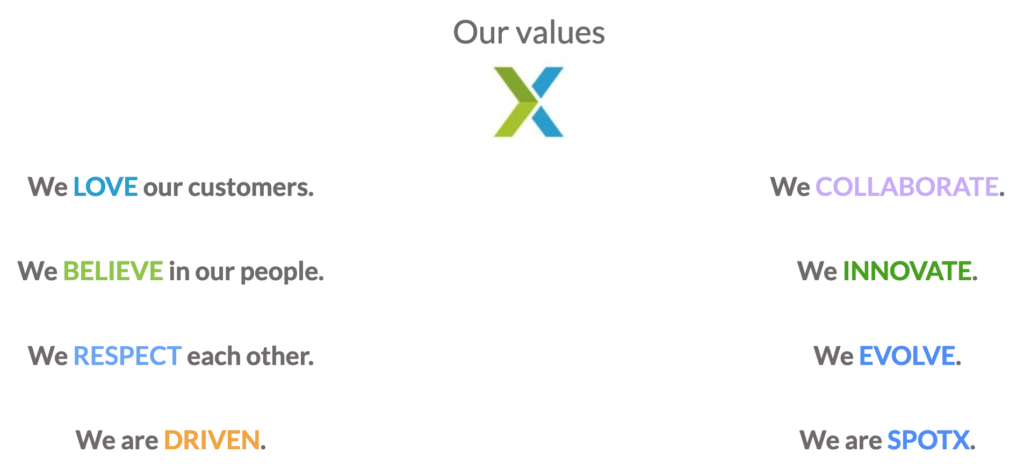
1. We love our customers.
2. We believe in our people.
3. We respect each other.
4. We are driven.
5. We collaborate.
6. We innovate.
7. We evolve.
8. We are SpotX.
Why they work
These core values are smart because they’re written with authority. They’re clear and direct, and they wrap up by giving ownership of the values back to the employees.
Additionally, they’re ordered logically.
SpotX’s core values clarify the company’s focus on its customers. Then they go through all the ways the business serves its customers and how employees treat each other. They wrap up with a value related to how the company does work, followed by a short affirmation.
Ordering your values so they progress naturally is a smart way to make them more memorable and sensible.
Social Solutions
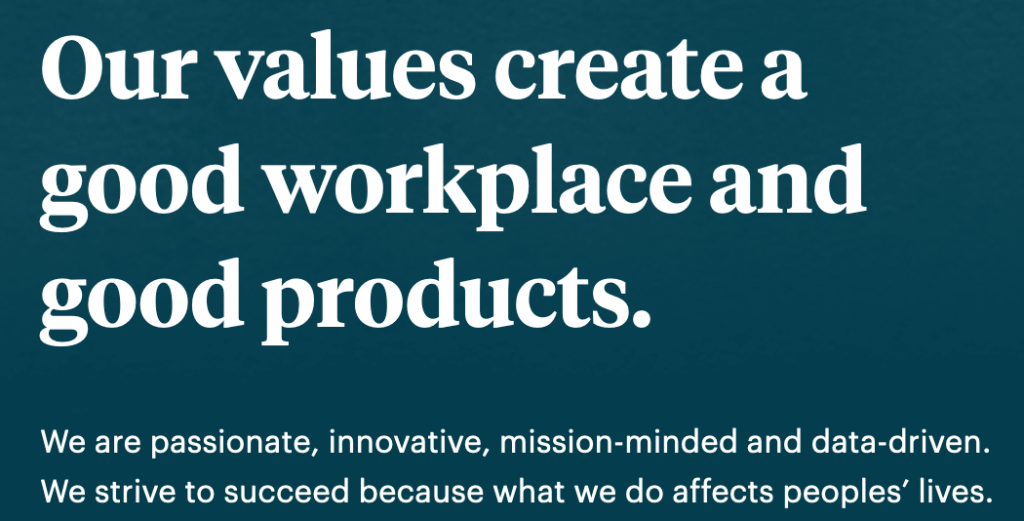
1. Get Stuff done.
2. Be innovative.
3. Be mission-minded.
4. Be data-driven.
5. Be passionate.
Why they work
Social Solutions goes all in on being actionable. Their core values are superbly actionable because they’re imperative statements. They are also simple and clear. There’s no question about what these values mean.
Additionally, they cover all the aspects of business operation, from how Social Solutions manages work to the best mindset for the job. These values cover all the bases.
How to operationalize your core values
Defining your core values is just the first step. After that, it’s time to operationalize those values by reinforcing them and making sure your business abides by them.
Putting values into action comes with its own challenges. But the problem of abiding by your core values is a good problem to have because it’s much harder — maybe impossible — to honor values that you haven’t yet established.
What this looks like at our company
To give you a more tangible idea of what it means to operationalize your core values (and to make them “relevant and actionable”) here’s how we created Biteable’s core values:

- Customer first: The Biteable teams make loads of decisions every day about design, marketing, and engineering. Following our “customer first” core value means always doing what’s best for the customer, even if it means more work or greater expense.
- Results-focused: Everything Biteable does has to work for our customers. We gauge Biteable’s success by the results our customers see with our product.
- Easy to use: This core value guides our user interface design and engineering decisions, but it also applies to our marketing and internal communications. We favor a user-friendly approach to everything we do.
- Always human: This is simpler than sounds. It boils down to being supportive and kind to each other and to our customers.
- Transparent and inclusive: Everyone gets a chance to speak, and we actively share information with anyone who needs it. This is especially relevant because our teams are fully remote. Open communication is critical to our success.
- Extraordinary: This is a work standard. It has to be extraordinary if we’re going to put the Biteable name on it. Good enough doesn’t cut it. In action, this means we favor maximizing quality over meeting deadlines.
Each of the Biteable core values has a direct impact on some aspect of the business. These values help drive actions, big and small, which make Biteable the sort of company that treats its team members as well as it treats its customers.
It’s core to our operations and it has been core to our success so far.
Put your core values into action with Biteable videos
A great way to start putting your company’s core values into action is to introduce them with a video. Do it in a flash with Biteable, the world’s simplest video maker.
Biteable has hundreds of brandable templates, ready-to-edit video scenes, and workplace-focused animations (plus over 1.8 million stock video clips and images). Make it your own with smart editing tools, then add your company colors with a single click using Bitable’s innovative brand builder.
With Biteable, you can create your core values video and send it out into the world in less time than it took Steve Prefontaine to run his first mile in a new pair of Nike running shoes.

